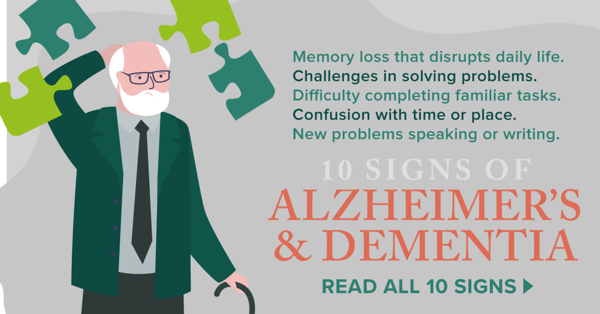In the U.S., nearly 7 million people age 65 and older currently have Alzheimer’s disease. By 2050, that number is expected to double.
“Working with seniors and their families, we understand that just thinking about the possibility of Alzheimer’s is very scary,” said Austin Blilie, Chief Operating Officer at Trail Ridge Home Care’s parent organization, ABHM. “That’s why we’re joining with other organizations to raise awareness and challenge the stigma around Alzheimer’s and other dementias.”
Alzheimer’s is a brain disease that causes a slow decline of memory, thinking and reasoning skills. According to the Alzheimer’s Association, there are 10 warning signs and symptoms of Alzheimer’s disease or a related dementia.
Memory loss that disrupts daily life. One of the most common signs, especially in the early stage, is forgetting recently learned information. Others include forgetting important dates or events, asking the same question over and over and increasingly needing to rely on memory aids or family members for things they used to handle on their own.
Challenges in planning or solving problem. Some people living with memory changes may experience changes in their ability to develop and follow a plan or work with numbers. They may have trouble following a familiar recipe or keeping track of bills. It may also take much longer to do things they did before.
Difficulty completing familiar tasks. People living with the disease often find it hard to complete daily tasks – driving to a familiar location, organizing a grocery list or remembering the rules of a favorite game.
Confusion with time or place. It’s not unusual for people with Alzheimer’s or a related dementia to lose track of dates, seasons and the passage of time. They may also forget where they are or how they got there.
Trouble understanding visual images and spatial relationships. Some people living with the disease could experience vision changes, which could lead to difficulty with balance or reading. They may also have problems judging distance and determining color or contrast – causing issues with driving.
New problems with words in speaking or writing. People who have Alzheimer’s or another form of dementia may have trouble following or joining a conversation. They may also struggle with vocabulary, have trouble naming a familiar object or use the wrong name.
Misplacing things and losing the ability to retrace steps. It’s not uncommon for people living with Alzheimer’s or a related dementia to put things in unusual places. They may lose things and be unable to go back over the steps to find them again.
Decreased or poor judgement. People living with Alzheimer’s or another dementia may use poor judgment when dealing with money or pay less attention to grooming or keeping themselves clean.
Withdrawal from work or social activities. Because people living with Alzheimer’s or other dementia may lose the ability to hold or follow a conversation, they may withdraw from hobbies, social activities or other engagements.
Changes in mood and personality. Individuals with Alzheimer’s or a related dementia my become confused, suspicious, depressed, fearful or anxious.
“I know from personal experience that there’s no magic bullet when it comes to Alzheimer’s and other dementias,” said Sierra Goetz, co-founder and operations director at the HomeCare Advocacy Network. “It’s a brutal disease – one that can put a lot of stress on families. I pray that someday there will be a cure. Until then, early detection is critical, because there are treatments that might relieve the symptoms and help you or your loved one maintain independence longer.”
To learn more about Trail Ridge Home Care’s customized dementia care and respite plans, visit TrailRidgeHomeCare.com
